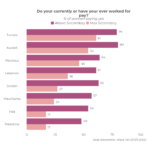Does internet usage increase the likelihood of political protest, and is the effect larger among women than men? Using data from three waves of the Arab Barometer Survey, historical research and interviews with women activists, this paper contributes to the growing body of literature on information ecology and contentious politics in the Middle East. We hypothesized that the internet increases public protest for all individuals but differentially enhances women’s involvement in public protest in the Middle East. We find that there are substantial gender gaps in internet usage and political protest, and that internet usage increases political protest of adults, on average, regardless of gender. However, internet usage does not differentially increase public protest among women (including during the Arab Spring). Our paper problematizes the notion that the internet is a low-cost and safe space for women’s political activism.
Visit External SiteTopics
- Charity2
- Corruption113
- COVID-1969
- Democracy35
- Discrimination13
- Economy225
- Education51
- Environment36
- Extremism19
- Freedoms50
- Gender Issues159
- Governance253
- Health44
- International Relations192
- Labor Market34
- Media31
- Migration63
- Political Institutions213
- Political Participation33
- Political Systems60
- Refugees6
- Religion118
- Security31
- Social Justice44
- Wellbeing2
- Youth75


